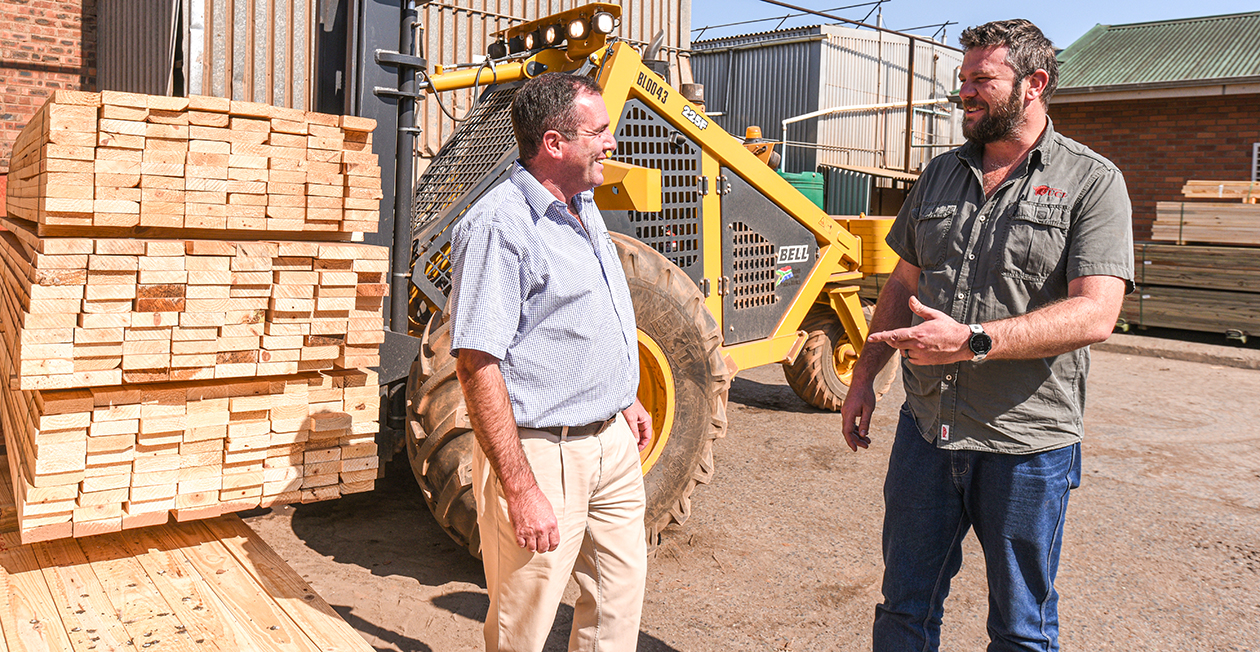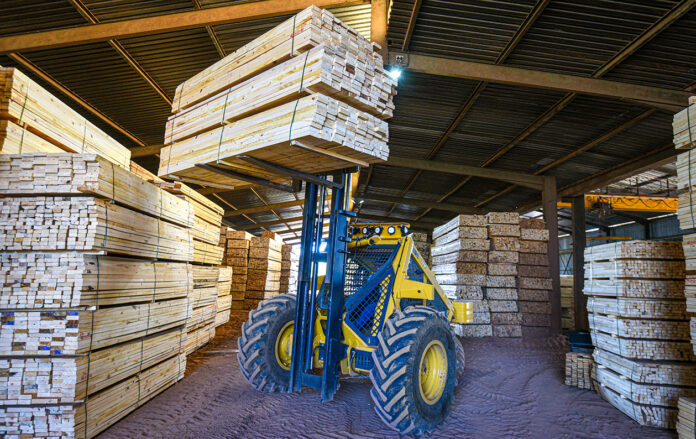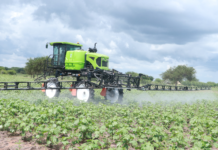Sawn timber is deceptively heavy and to move it around safely within a large storage area or loading bay, on sometimes uneven surfaces, taxes any machine’s mettle to the limit.
But there is one loading tool – a now almost legendary machine with only three wheels – that has proved time and again that it is up to the task.
Back in 1924, a wattle bark milling company was established near Dalton in the low rolling hills of the KwaZulu-Natal Midlands. The UCL Company (Pty) Ltd showed steady growth to become a major player in the manufacture of wattle tannin extracts, sugar and pine lumber. The company also owns and actively farms 6 500 hectares of agricultural land in addition to having a trading division that supplies agricultural input materials.
The UCL Company’s operations proudly serve the interests of its raw material suppliers, who are also the company’s shareholders, and has long term objectives of being a sustainable supply base for these members and their supporting communities.
It’s in the sawmilling division at Glenside that we find Mark Redinger, the Sawmill Manager and Keith Bailey, the Operations Manager. “We produce pine products for the South African market and also export to a variety of countries,” Mark says. “Our timber is used for the structural, industrial, crating, pallet, moulding and furniture markets and can be bought through our own retail division as well.”
The Glenside sawmill was formerly known as Küsel’s Sawmill and started up in 1935. The sawmill is known for the high quality of its sawn board which is cut from 28-year-old SA pine trees grown on the company’s own land and that of its shareholders and other neighbouring suppliers up to 100km away. The sawmill’s presence makes the growing of timber in the area sustainable and this in turn ensures job security for many in the growing areas, at the mill and in support industries.
“Our maximum target is cutting 340 cubic metres a day and to do this we need a constant feed of timber into the mill,” says Keith. “This is done with the help of five stationary cranes and a Bell 225A Tele Logger which assists us with the ad hoc unloading of trucks and feeding the de-barker. We have a further three, Bell 225A Tele Loggers to assist with infield loading and we’ve been using these Bell Tele Loggers since 2004.”
Once the timber has been sawn into the many sizes and shapes the market demands, it is stacked into predetermined bundles and this is where the grunt work starts as in contrast to timber logs, these are huge rectangles of timber. Two or three of these bundles are moved at a time and they can have a mass of up to 3,5 tons. To move these bundles of timber to areas where the timber is treated or awaiting transport, the UCL Sawmill uses Bell Forklifts that are based on the proven three-wheeler base that the Bell Logger uses.
“We first bought two used Bell 220A Forklifts in 2002, which we refurbished for them to subsequently give us many thousands of hours of service,” Keith continues. “We then, in 2005, bought our first new Bell 225A Forklift and we had the mast modified by Bell Equipment to give us better reach when loading trucks. It is imperative for us to fill a truck properly hence the higher mast.”
Since that time UCL has bought two more new Bell 225A Forklifts. The company’s policy is to run their Bell Loggers and Forklifts to 10 000 hours before replacing. One of their older Bell Forklifts had reached this milestone by 2022 and it was decided to replace it. Mark says in fairness they had done wider research across the heavy-duty forklift market but had decided on a Bell 225F-series Forklift in the end for several reasons.
“Bell Equipment’s Sales Representative, Keith Milne, came and gave us the specifications of the new F-series Bell 225 Forklift and what stood out for us was that with a tighter turning circle than competitor machines and a now higher mast that met our requirements without any modifications, Bell was still the brand to stick with,” he says. “We also felt that our mechanics knew the Bell brand and it would be easier to buy spares and service kits from one supplier.”
The UCL Sawmill team has been impressed by how much quieter the new Yanmar 45kW engine is and with average fuel consumption at 3,15 litres per hour and an enclosed cab ensuring greater operator safety, the Bell 225F Forklift is ticking all the boxes.
“Our Bell Forklifts work very hard and on a given day, move anything up to 80 cubic metres of timber in the treatment area and load another 150 cubic metres onto trucks for distribution,” Keith adds. “Bell Equipment’s price was competitive and with Keith Milne’s assistance this new machine was delivered sooner than we expected it which was a real bonus for us in production terms.”

Source : Bellequipment








